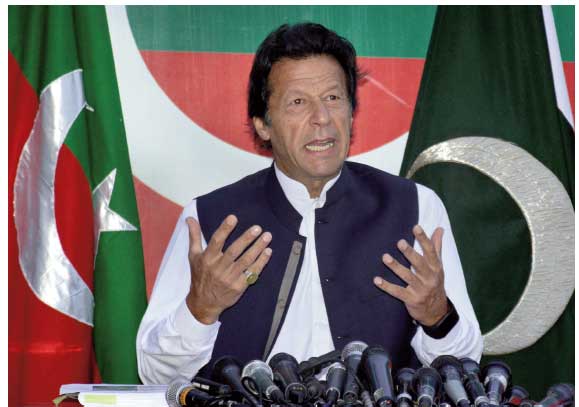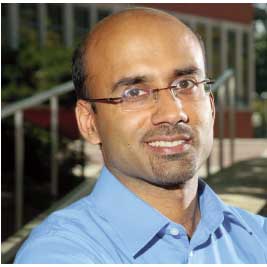
 |
Imran’s naya PakIstan ?
Hardline ground realities re-surface !Hari Jaisingh
Imran Khan’s moves are well-intentioned. But Pakistan’s ground realities are harsh and crude. Apart from vested interests and feudal elites in the Pak establishment, the army-backed hardliners did not relish the appointment of renowned Pakistani- American economist Atif Rahman Mian to the new Economic Advisory Council (EAC) simply because he is an Ahmadi Muslim by faith.
The real challenge for Imran Khan will be how he manages to handle his military establishment to control the activities of Taliban and other terrorist forces in Pakistan as well as against India. The US has avoided mentioning India as a victim of Pak-sponsored terror. However, no other nation has used terror so ruthlessly as an instrument of state policy as Pakistan has done for decades, principally against India, specifically in Jammu and Kashmir. It is a known fact that the Pakistan army’s Inter-Services Intelligence (ISI) “subverts, coopts and kills” with ruthless efficiency. It targets India “an Enemy No. 1” and has earmarked sufficient defence budget for its “outsourced terror wings”: Lashkar-e-Taiba (LeT), Jaish-e- Mohammed (JeM), Hizbul Mujahideen and other smaller terror groups. A portion of these funds is kept aside for Hurriyat leaders in the Valley who use “money” for buying land and financing “young stone pelters” and other mischievous elements. I am raising these matters against the backdrop of Imran Khan’s desire for the resumption of India-Pakistan dialogue. Of course, bilateral talk needs to be resumed. But my point is: has the new Prime Minister taken clearance for the resumption of Indo-Pak dialogue from allpowerful Generals? I have said it earlier that talk and terror cannot go together. We are well aware of Imran’s political limitations. He cannot cross the army-line of thinking vis-à-vis India. In this context, I would like to remind Imran Khan and Pakistani Generals of Paul Kennedy’s observation in his book “Rise and fall of Great Empires” that “past empires fell when economic dynamism stagnated and military power was needlessly over-extended”. This exactly is Pakistan’s reality. The real challenge for Imran Khan will be how he manages to handle his military establishment to control the activities of Taliban and other terrorist forces In Pakistan as well as against India. Curbing terror activities will help to infuse some degree of economic dynamism if he means to translate his dream of a “welfare state” for the benefit of the poor in Pakistan. Prime Minister Imran Khan and his patrons ought to understand that the militants are mostly mercenaries of Pakistan’s intelligence agency. They are “soldiers of Islam,” financed by the army and its collaborators. They cannot be allowed to dictate solutions to bilateral issues by force. Creating a welfare state is not like building castles in the air. It requires certain adjustment of priorities. Has Imran realised how Pakistan’s precious resources are spent on “training camps” for new recruits for the business of terrorism directed against India. And with what results? Also, if he wants peace with India, he has to tell his Generals about his plan of action for peace. If he and the Generals have really undergone a change of heart for a constructive dialogue with India, Islamabad will have to give up the confrontionist path and bury Zia’s concept of the proxy war to grab Kashmir by hook or by crook. This has been tried for decades, but with what results? Prime Minister Imran Khan and
his patrons ought to understand
that the militants are mostly
mercenaries of Pakistan’s
intelligence agency. They are
“soldiers of Islam” financed by the
army and its collaborators. They
cannot be allowed to dictate
solutions to bilateral issues by
force. We have seen what such
attempts to create Utopia have
resulted in. That is why in
Kashmir, the Kalashnikav cult
cannot be allowed to win. In any scheme of things, the Pandits have to go back to their homeland in the Valley. Their presence in Kashmir will have to be a constant reminder of the Valley’s multireligious past. The Valley cannot be seen the way the Pak Army-backed hardliners and Islamic fundamentalists think. It is surely a gamble. No one knows the end results. But it is worth remembering that there cannot be shortcuts to peace. If Islamabad means business, every possible solution can be discussed and explored, provided the new leadership shed their past prejudices and viewed the bilateral problems in a large framework of cooperation and not through narrow religious angularities. All of us, including Pakistanis, need to see and understand the damage fanatics can inflict on the people. A poignant example is Talibanised Afghanistan which will, sooner or later, engulf the very persons who are playing their tunes as part of their politics of expediency. The problem with the Pakistani mindset is that prejudices are mistaken for truth, passion for reason, fundamentalism for religion and myths for history! Let Imran Khan’s Pakistan learn to see the sub-continent as part of common heritage and civilization values and feel the difference. In any scheme of things, the Pandits have to go back to their homeland in the Valley. Their presence in Kashmir will have to be a constant reminder of the Valley’s multi-religious past. The Valley cannot be seen the way the Pak Army-backed hardliners and Islamic fundamentalists think. |
|



 Atif Rahman Mian
Atif Rahman Mian